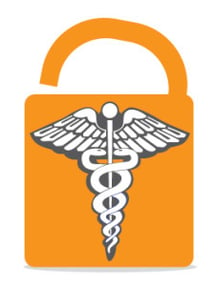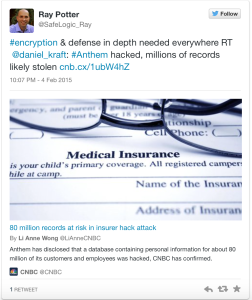Important News:SafeLogic Announces CryptoComply Go v4.0 with Comprehensive PQC Capabilities!! Read the announcement.
On Encryption Keys (and Anthem) - Part 2 of 2
February 9, 2015 •Ray Potter
 The Anthem breach encouraged me to wrap up this blog series and talk about key management in a genuine security context. When the Anthem breach first was public, it looked as if patient records were accessed because of lack of data encryption. Then Anthem stated the real reason for the breach: they only encrypt data in flight to/from the database(s) and rely on user credentials for access to data in the database. Why didn’t they encrypt the data in the database? Well, per Health Insurance Portability and Accountability Act (HIPAA) requirements, they don’t have to as long as they provide protection of the data via other means. Like elevated credentials.
The Anthem breach encouraged me to wrap up this blog series and talk about key management in a genuine security context. When the Anthem breach first was public, it looked as if patient records were accessed because of lack of data encryption. Then Anthem stated the real reason for the breach: they only encrypt data in flight to/from the database(s) and rely on user credentials for access to data in the database. Why didn’t they encrypt the data in the database? Well, per Health Insurance Portability and Accountability Act (HIPAA) requirements, they don’t have to as long as they provide protection of the data via other means. Like elevated credentials.
That worked well, didn’t it?
They were compliant, but obviously not secure. To add more security to compliance programs like HIPAA, there have been some cries for enterprises to implement encryption. So how do you encrypt data properly? Well, it all depends on your environment, the sensitivity of the data, the threat models, and any tangible requirements for regulatory compliance. Here are some general guidelines:
- Use validated encryption.
- Use strong, well-generated keys.
- Manage the keys properly.
Use validated encryption. Federal Information Processing Standard (FIPS) 140 is the gold standard. The Advanced Encryption Standard (AES) is one of the FIPS-approved algorithms for data encryption, and it is a better encryption algorithm than what Joe the Computer Science Intern presented in his thesis project. It just is. Plus, part of the FIPS 140 process involves strenuous black box testing of the algorithms to ensure they’re implemented properly. This is crucial for interoperability, and proper implementation of the AES standard also provides a measure of confidence that there aren’t leaks, faults, etc. Always look for the FIPS 140 certificate for your encryption solution.
Use well-generated keys. A password-based key (PBK) is crap. Here a key is derived from a password after it’s hashed with a message digest function. PBKs are crap because most passwords are crap. They’re subject to brute-force attack and just should not be used. Password-Based Key Derivation Function v2 (PBKDF2) makes password-based keys a bit stronger by conditioning the digest with random elements (called salt) to decrease the threat of brute force. But the threat is still there.
Keys should be as unpredictable and “random” as possible. Unfortunately in software environments it’s difficult to obtain truly random data because computers are designed to function predictably (if I do X, then Y happens). But let’s say you can get provable random data from your mobile device or your appliance. Use that to feed a conditioning algorithm and/or pseudorandom number generator. Then use that output for your key.
Use strong keys. The strength of a key depends on how it’s generated (see above) and how long the key is. For example, the AES algorithm can accommodate key sizes of 128-bits, 192-bits, or 256-bits. Consider using a key size that correlates to the overall sensitivity of your data. In Suite B, 256-bit keys can be used to protect classified data at the Top Secret level. Is your data tantamount to what the government would consider Top Secret?
Also consider the environment. Constrained and embedded environments (think wearables) may not have the processing power to handle bulk encryption with 256-bit keys. Or maybe data is ephemeral and wiped after a few seconds and therefore doesn’t need “top secret level” encryption. Or maybe there’s just not enough space for a 256-bit key.
Use a key that is strong enough to protect the data within the constraints of the environment and one that can counter the threats to that environment.
Manage your keys properly. You wouldn’t leave the key to your front door taped to the door itself. Hopefully you don’t put it under the doormat either. What would be the point of the lock? The same applies to information security. Don’t encrypt your data with a strong, properly generated data encryption key (DEK) then leave that key under the doormat.
Consider a key vault and use key encryption keys (KEK) to encrypt the data encryption keys. Access to this key vault or key manager should also be suitably locked down and tightly controlled (again, many different ways to do this). Otherwise you might as well just not encrypt your data.
While we’re at it: rotate your keys, especially your KEKs. Key rotation essentially means “key replacement” … and it’s a good idea in case the key or system is compromised. When you replace a key, be sure to overwrite with Fs or 0s to reduce any chance of traceability.
Store those DEKs encrypted with KEKs and protect those KEKs with tools and processes. And remember to balance security with usability: rotating your KEK every 2 seconds might be secure, but is your system usable?
Anthem wanted the data to be useful, which is why it wasn’t encrypted at the database. But that usability came at a high cost. The good news is that it is possible to encrypt data and have it be usable.
Encryption is a critical, necessary piece of a system’s overall security posture. But it’s not the sole answer. In Anthem’s case, records were accessed via those “elevated user credentials” … which means that malicious hackers were able to get in to the authentication server and raise privilege levels of user credentials (usernames/passwords) that they either knew or gleaned from the auth server. So in this case, it’s irrelevant if the breached data was encrypted; the hackers had authenticated and authorized access to it.
So what’s the answer?
When this was first reported I tweeted this:

Defense in depth means providing security controls to address all aspects of the system: people, process, and technology. Technology is the most difficult pillar to lock down because there are so many layers and threats, hence so many products such as firewalls, IDP, APT, IDS, SIEM, 2FA, AV, smart cards, cloud gateways, etc.
Encryption is a fundamental element for security of data at rest and data in motion (control plane and data plane). Even the strongest encryption with proper key management won’t protect data that is accessed by an authorized user, because it has to be usable. However, encrypted data and tight management of keys provides a critical, necessary piece to a robust security posture.
I hope this provides some guidance on how to think about encryption and key management in your organization.

Ray Potter
Ray Potter is the Founder of SafeLogic, which was spun off from his previous venture, the Apex Assurance Group consulting firm. He brings over 20 years of security and compliance experience, including leading teams at Cisco and Ernst & Young, to the operations team at SafeLogic. Ray loves playing guitar and flying airplanes.
Popular Posts
Search for posts
Tags
- FIPS 140 (109)
- FIPS Validation (79)
- NIST (66)
- CryptoComply (63)
- Encryption (61)
- Cryptography (60)
- CMVP (51)
- Cryptographic Module (49)
- Industry News (47)
- Compliance (44)
- RapidCert (42)
- Conversations (34)
- Post-Quantum Cryptography (PQC) (30)
- SafeLogic News (30)
- FIPS 140-3 (26)
- CAVP (23)
- Federal (23)
- OpenSSL (20)
- Cybersecurity (17)
- FedRAMP (14)
- Government (14)
- Healthcare (12)
- DoD (11)
- CMMC (8)
- NIST 800-53 (7)
- Entropy Source Validation (5)
- NIST 800-171 (5)
- iOS (5)
- Common Criteria (4)
- Crypto-Agility (4)
- Entropy (4)
- GovRAMP (4)
- RSA Conference (4)
- TLS 1.3 (4)
- Public Sector (3)
- FIPS 140-2 (2)
- DoDIN APL (1)
- Finance (1)

